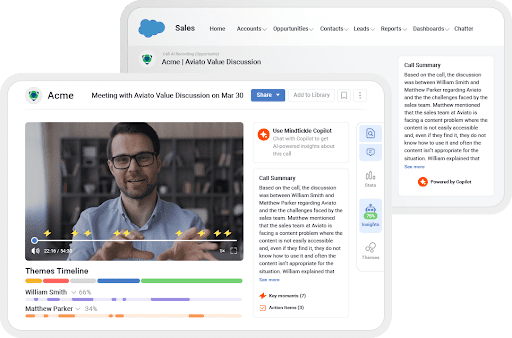B2B sales reps are no strangers to making phone calls – and lots of them. Research tells us sales reps make an average of 40 calls per day.
But chances are, every sales rep on your team has had the unfortunate experience of a bad sales call.
With the right sales call script, your sellers can be prepared to ace any sales interaction. In fact, sales call scripts can empower all sellers – from newbies to veterans – to engage more buyers and close more deals.
In this post, we’ll discuss what sales call scripts are and share some examples you can use in 2025 to close more deals.
Of course, sales call scripts aren’t one-size-fits-all. With that in mind, we’ll also share best practices for creating sales call scripts that will deliver the biggest impact for your organization.
What is a sales call script?
Before we jump right into sales call script examples, let’s take a step back to explore what a sales call script is.
What sales call scripts are
A sales call script is a written guide or outline that helps sellers structure their conversations with prospective customers. Scripts can be developed to help sellers stay focused during a variety of different types of sales calls. We’ll explore some of the different types of sales scripts later on.
As the name suggests, sales call scripts are used for phone calls. However, these scripts can also be adapted for other interactions, including emails, live chats, and LinkedIn messages. This is important to note, as many interactions between buyers and sellers occur via digital channels.
What sales call scripts aren’t
Scripts aren’t meant to be recited word-for-word. If a seller takes this approach, they’ll come across as inauthentic or even robotic.
Instead, sales call scripts should be used as flexible guides. Scripts can help ensure sellers cover the right information during different sales calls. However, sales reps can (and should) personalize and adapt call scripts for each interaction. That way, they can build authentic connections with each prospect.
Types of sales calls scripts
Organizations often develop sales call scripts to guide sellers through different sales scenarios. Here are some common sales call script examples.
#1 Cold call script
There’s a lot of pressure when making that first connection with a prospect. The first call sets the tone for the entire relationship, and it’s important to get it right. A BsB sales cold call script can help ensure your sellers get off the right foot.
#2 Cold call voicemail script
Your prospects won’t pick up the phone every time you call. Therefore, it’s important to equip sellers with a sales call script so they don’t fumble when they reach a prospect’s voicemail.
#3 Follow-up sales call script
You’ve already made an initial connection with a prospect. A follow-up sales call script can help you reconnect with the prospect and guide them to take the next step in the purchase journey.
#4 Follow-up voicemail script
When following up with a prospect, you might reach out to their voicemail. With the right sales call script, you can entice them to pick up the phone and return your call.
#5 Objection handling script
Sellers are bound to encounter objections. With the right sales call script, they can anticipate potential objections – and be equipped to address them.
#6 Breakup sales call script
Persistence is key in B2B sales. However, there comes a point when a rep has to decide whether or not to keep trying. A breakup sales call script can help sellers navigate these conversations.
Winning sales call script templates
There’s no single sales call script that every seller should use in every scenario. Instead, it’s a best practice to develop sales call scripts for common sales scenarios – and empower your sellers to adapt and personalize them as appropriate.
However, a sales call script template can be a great starting point.
With that in mind, here are a few sales call script templates to get you started.
#1 Cold call script template
This simple cold call script template can help you connect with any prospect.
“Hi [prospect name!]. This is [seller name] from [company name]. How’s your day going?”
If they respond positively:
- “Great! I’m going to keep this brief, because I know your time is very valuable.”
If they respond negatively:
- “I’m sorry to hear that. I’m going to keep this brief, because I know your time is very valuable.”
Then, briefly explain the purpose of the call.
“I’m reaching out to you because we’ve helped businesses like yours [solve this problem/achieve this goal]. I’m confident you could achieve similar results, and I’d love to see if you’re interested in learning more about this.
If now is not a good time:
- “No worries! I’m happy to call back. Does tomorrow at 3:00pm work for you?”
If now is a good time:
- Move into your sales pitch.
#2 Cold call voicemail template
Leaving a voicemail can be nerve-wracking. A short and sweet voicemail template can keep your message focused and pique your prospect’s interest.
“Hi there, [prospect name]! This is [seller name] from [company name]. Hope you’re having a great day. I’m trying to get in touch with you because we’ve recently helped businesses like yours achieve [goal/result]. I’ll love to connect for five or ten minutes to see if there’s an opportunity for us to help you get similar results.
Please give me a call back at [phone number] whenever you have a few minutes. I’m going to follow up by email, in case that’s a better way to set up some time to chat.
Thanks so much, [prospect name]! I’m looking forward to hearing from you.”
#3 Follow-up sales call script
You’ve made an initial connection with the prospect, and now it’s time to follow up to keep things on track. Follow-up sales call script templates aren’t as straightforward. That’s because follow-ups must be tailored to the discussions the seller has already had with the prospect.
However, here’s a simple sales call script template to use as a starting point when following up with a prospect.
“Hey [prospect name!]. This is [seller name] from [company name]. I’m so glad to connect with you again today. How’s your day going?”
If they respond positively:
- “I’m glad to hear it!”
If they respond negatively:
- “I’m sorry to hear that! That sounds really frustrating.”
Then, recap the last call and how your solution can deliver value.
“Last time we chatted, you mentioned how [company] was really struggling with [challenge]. I’ve been thinking more about this, and I really feel confident we can help you overcome this challenge. Just recently, [customer name] was able to achieve [results] from using our solution.”
Then, work to propel the conversation forward.
“I think the best way to understand how our solution can be a game changer is to see it in action. I’d love to schedule some time for me to demo the product. Does Wednesday or Thursday afternoon work?”
#4 Follow-up voicemail script
You may not always be able to reach your prospect live. A simple voicemail script can remind the prospect of your value and encourage them to take the next step.
“Hi [prospect name]! It’s [seller name] over at [company name]. Hope you’re having a great week.
I really enjoyed connecting last week to learn more about [company name]’s challenges/struggles. I’ve been thinking about our conversation a lot, and I feel really confident that we can help you overcome that challenge – similar to what we did for another customer of ours.
I’d love to find a time for you to see our solution in action. Please give me a call back or shoot me an email to let me know if Wednesday afternoon works or if there’s another day that would be better.
Thanks so much, [prospect name]! Looking forward to connecting again.”
#5 Objection handling script
No one-size-fits-all sales call script will work for every objection that comes your way. That’s because prospects raise a wide variety of objections, and each one must be addressed differently.
However, a simple script can help you prepare to overcome objections.
“Hi [project name]! This is [seller name] from [company name]. How’s it going today?”
If they respond positively:
- “I’m glad to hear it!”
If they respond negatively:
- “I’m sorry to hear that! That sounds really frustrating.”
“Hey, I’m following up on the conversation we had last week about how our solution can help you overcome [key challenges]. Do you have any questions about what we discussed?”
When the buyer objects, acknowledge it to show understanding and empathy.
“You feel that our solution is too expensive – especially when compared to [competitor]’s solution. I totally get that.”
Then, work to overcome the objection.
“To be honest, several of our existing clients initially had this same hesitation. But they found our solution actually helped them [save money/cut costs/etc.]. I’d love to share more details on how [current customer name] was able to [achieve this goal] with our solution. Or alternatively, we can run an ROI analysis to get you a better idea of the value you can expect from investing in this solution.”
#6 Breakup sales call script
A breakup sales call script can help you determine whether it’s time to cut your losses.
“Hey [prospect name]! How’s it going?
If they respond positively:
- “That’s great!”
If they respond negatively:
- “I’m sorry to hear that!”
Then, cut to the chase.
“Last time we connected, we had a great conversation about [pain point] and how our solution can help you overcome this challenge. But I haven’t heard back from you since. I wanted to reach out one last time to see if you had any questions and if you think it makes sense to keep the conversation going.”
Best practices for developing winning sales call scripts
Sales call script templates can be a great starting point. But you shouldn’t stop there.
Every revenue organization is different. And every prospect is different too.
Creating sales scripts that fit your needs and deliver great results is important.
With that in mind, here are some best practices for developing effective sales call scripts to help your sellers engage prospects and close more deals.
#1 Make a list of common types of sales calls
Sure, every sales call is unique. But your sellers likely encounter some common types of sales calls, such as cold calls, voicemails, and objection handling calls.
Start by making a list of the types of sales calls your sellers make most often. But don’t just make guesses. Instead, leverage data and ask for feedback from your sales reps.
#2 Focus on value rather than features
Reciting a laundry list of product features doesn’t capture buyers’ attention. Instead, focus on what your solution can do for your prospects. Ensure your sales call scripts feature talking points about the value of your solution.
#3 Include open-ended questions
Sales calls should be a dialogue rather than a monologue. So avoid using many questions in your sales call scripts that can be answered with a simple yes or no. Instead, incorporate open-ended questions that’ll get the prospect talking. Then, the seller can tailor their approach based on the prospect’s answers.
#4 Keeps your sales call scripts flexible
Sales call scripts shouldn’t be rigid. Instead, they must be flexible and easily adapted to any sales scenario.
Ensure your sellers understand the importance of personalizing sales call scripts – and how to do so.
#5 Provide training and practice opportunities for your sellers
Just because you provide sales call scripts doesn’t mean your sellers know how to use them.
Be sure to provide training and enablement so sellers know where to find sales scripts and how to use them. In addition, provide opportunities for your sellers to practice using sales scripts. For example, you might leverage AI-powered role plays to allow sellers to practice their skills and get feedback before money is on the line.
#6 Leverage conversation intelligence to see how sellers are using sales call scripts
All too often, organizations create sales call scripts for their teams but have little insight into how (or if) they’re being used in the field. With a conversation intelligence tool, you can get insight into what’s actually happening in the field – without having to sit in on sales calls or listen to hours of call recordings.

Conversation intelligence tools deliver immediate feedback to sellers, which they can use to improve their skills. Sales managers can also look for trends in a rep’s behaviors, which can inform sales coaching opportunities.
#7 Revisit your sales call scripts often
It doesn’t make sense to create a sales call script and then never look at it again. Instead, revisit your sales call scripts regularly.
Leverage data to see what’s working and what’s not. You can use these insights to make improvements to your sales call scripts.
Ace all of your sales calls with Mindtickle
In today’s world, several different channels exist for connecting with customers and prospects. Yet sales calls remain a key channel for engaging B2B buyers and closing deals.
With the right sales call script templates, your sellers will be prepared to conquer any sales call they make. And with an integrated revenue enablement platform like Mindtickle, you can centrally store and organize all your sales call scripts so sellers can quickly and easily find what they need for any sales scenario.
Developing sales call scripts is important. But providing these tools to sellers doesn’t mean they’re using the right sales call scripts and skills.
Mindtickle’s conversation intelligence feature provides sales call analysis. Sellers get real-time feedback after every call, which they can use to hone their skills and increase their chances of success. And sales leaders can use sales call analysis to identify where sellers are shining – and where there are opportunities for improvement. Sales managers can use these insights to deliver coaching that empowers sellers to improve their sales call skills – and start closing more deals.
Conversation Intelligence in MIndtickle
Ready to see how Mindtickle supercharges your sales? Schedule a personalized demo today and unlock your team's full potential.
Request a Demo


 By Rahul Mathew
By Rahul Mathew

 By Christian Pieper
By Christian Pieper